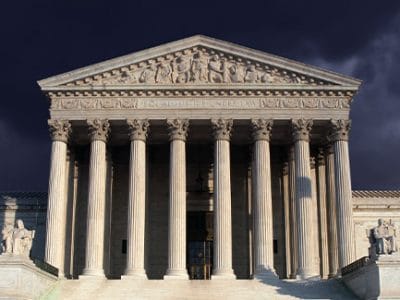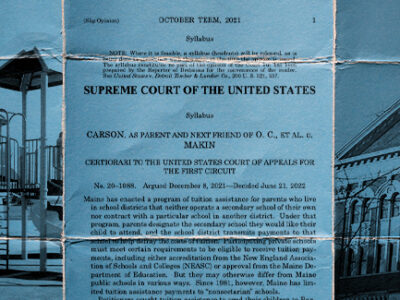As we celebrate Presidents’ Day we have many reasons to be thankful for George Washington. The Virginian was a giant even among the remarkable generation of America’s founders. At 6 feet 2 inches, he physically towered over almost all of them. His exceptional character and extraordinary contributions led historian James Flexner to declare him “indispensable” to the success of the patriot cause and the new republic. Risking his reputation, wealth and life, he commanded a rag-tag army to an improbable victory over the world’s leading economic and military power. As president, he kept the new nation from crashing on the shoals of anarchy, monarchy or revolution.
A less well-known reason for appreciating Washington is the tremendous contribution he made to the success of what Thomas Jefferson called the “fair experiment” of “whether freedom of religion is compatible with order in government and obedience to the laws.” Could a nation that had no established church and did not require citizens to worship foster the piety and morality necessary to sustain a republic?
Historians argue that the separation of church and state, the absence of religious tests for holding office, and freedom of worship were the most radical aspects of the American Revolution. Some other Western nations had no king and had given political authority to elected bodies, but before 1789 none had disestablished the church and allowed full religious liberty.
While Jefferson and James Madison led efforts to establish religious freedom in Virginia and frame the First Amendment, Washington used his enormous prestige and influence as both commander in chief of the Continental Army and the nation’s first president to promote freedom of worship and religious tolerance and to cultivate positive relations among America’s various religious bodies. By his words and actions, he played a leading role in America’s shift from state-established religion to the prohibition of a national church and the guarantee of freedom of worship. Washington spoke out forcefully for religious freedom while many states continued to have religious restrictions and many of his compatriots opposed complete religious liberty.
Like Jefferson and Madison, Washington supported freedom of conscience and religious practice for both ideological and practical reasons. He noted that people reached very difference conclusions “on questions of the greatest import, human and divine.” Washington argued that Christians should be able to take “that road to heaven which to them shall seem the most direct, plainest, easiest and least liable to exception.” Religion, he added, had historically fostered division, discord and even war. Therefore, as the most denominationally diverse and ethnically eclectic nation in world history, the United States could flourish only if its citizens enjoyed religious freedom.
As commander in chief, Washington refused to tolerate religious prejudice among his soldiers. As his troops prepared to attack Canada in September 1775, Washington instructed them to avoid ridiculing their northern neighbors’ Roman Catholic faith and to protect the country’s “free exercise of the religion.” “While we are contending for our own liberty,” the general added, “we should be very cautious of violating the rights of conscience in others,” because “God alone is the judge of the hearts of men.” Washington also prohibited his troops from celebrating “Pope’s Day” — the “ridiculous and childish custom of burning the effigy of the pope.” Moreover, he upheld the right of a Universalist minister to serve as a chaplain in the army.
Washington clearly believed that religious and civil liberties were intertwined in the American struggle for independence. Convinced “that our religious liberties were as essential as our civil,” he insisted that he had always promoted them both.Shortly after the peace treaty with Great Britain was signed in 1783, he told a religious body that “the establishment of civil and religious liberty was the motive which induced me into the field.”
As president, Washington continued to promote religious liberty. He promised Methodists that he would do all he could to preserve “the civil and religious liberties of the American people” and to be “a faithful and impartial patron of genuine, vital religion.” He rejoiced “to see Christians of different denominations dwell together in more charity, and conduct themselves in respect to each other with a more Christian-like spirit than ever they have done . . . in any other nation.” The liberty Americans enjoyed to worship “Almighty God agreeable to their consciences,” Washington told Quakers, “is not only among the choicest of their blessings, but also of their rights.”
Washington strove to protect the religious rights of America’s Catholics and Jews. Countering arguments that the federal government should give Protestants special consideration because of their role in founding the republic, Washington urged citizens in 1790 not to “forget the patriotic part” Catholics had played in winning the Revolutionary War and in establishing the new government. Jewish leaders sent Washington several letters expressing their gratitude that their rights far surpassed those of their co-religionists in any other country. Savannah Jews praised his role in dispelling the “cloud of bigotry and superstition” that long had plagued them and in giving them “all the privileges and immunities of free citizens.”
As we celebrate Washington’s many contributions this Presidents Day, let’s recognize his crucial role in promoting America’s religious liberty.




